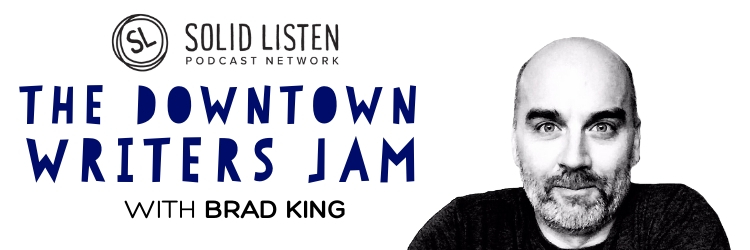
Sometimes—ever so rarely—Twitter isn’t a dumpster fire. And, a few weeks ago the hellsite brought author and journalist Don Merrill to the Bunker. He’s the author of Pledge, a book about nonprofit radio, but he’s also one of the most interesting people to join Brad on the Jam.
He served in the military, where he discovered his passion for journalism. He’s also worked in public affairs, all while keeping one foot in the world of journalism.
And after retiring to Portland, he joined a community radio station and helped build out its news operation.
About Don Merrill
 I joined the U.S. Army in 1976 as a clerk-typist, but re-enlisted as a 71 [R]omeo; the military’s designation for broadcast journalist. After attending the joint service Defense Information School at Fort Benjamin Harrison, Indiana, I served at the Pentagon’s Combat Pictorial Detachment, at the American Forces Korea Network and later, at Southern European Broadcasting in Italy. While in the Army, I went to school and graduated with a two year degree. I left the service in 1988, moved to Cincinnati and worked at WRRM , WKRC and later, the Cincinnati Enquirer.
I joined the U.S. Army in 1976 as a clerk-typist, but re-enlisted as a 71 [R]omeo; the military’s designation for broadcast journalist. After attending the joint service Defense Information School at Fort Benjamin Harrison, Indiana, I served at the Pentagon’s Combat Pictorial Detachment, at the American Forces Korea Network and later, at Southern European Broadcasting in Italy. While in the Army, I went to school and graduated with a two year degree. I left the service in 1988, moved to Cincinnati and worked at WRRM , WKRC and later, the Cincinnati Enquirer.
I freelanced part-time in the mid-90s while going to school, but moved to Utah for a federal job in the late 90s and stopped both writing and school. I started writing again briefly in the mid-2000s however, and during that time, I wrote a lot, including an expose’ on the successes and failures of the Salt Lake City NAACP. During those 12 years in Utah, I served as a public affairs specialist at a government office and oversaw several large events, including a centennial celebration.
I also returned to school, adding more credits toward my four year degree, which I got in 2010. I stopped freelancing after retiring in 2012 and moving to Oregon.
But I started volunteering at KBOO community radio’s news department in Portland almost right away. And in 2014, I managed a team of reporters for a project funded by the Fund for Investigative Journalism that examined the influence of the American Legislative Exchange Council on the Oregon legislature. In the meantime, I built several websites, including a promo site for PLEDGE. That site has become this site to coincide with the book’s launch.
I got the idea for PLEDGE because I was annoyed by pledge drives I’d been hearing since the mid 90s, and I decided I wanted to rant about them. But I quickly realized that public radio is in a terrible spot between money and mission. Going deeper, I learned of things affecting the genre that most people never consider as they listen to their regular shows for days, weeks, months and years on end.
They include hunts for the ultimate content sharing technology, public radio’s struggles to not lose its soul to corporate money, how it must surveil its listeners to serve them without treating them like numbers or “prey”, how budget cuts can make stations change character or disappear altogether and finally, keeping affiliates from feeling
bypassed by networks that have found workarounds to their audiences. I want readers to buy the book because public radio needs them to understand it much better than they currently can. That’s because public radio hides its problems and convinces the world that everything is fine while facing stress fractures in every direction. It needs to be as open and honest about what it essentially is and needs as when it asks for money. A greater public can more fully support it only if they know the real deal.
Books





Brad, thank you so much. It was a great conversation and you did a excellent job keeping me on track and bringing out stuff you found interesting from the massive ball of twine that is my life.